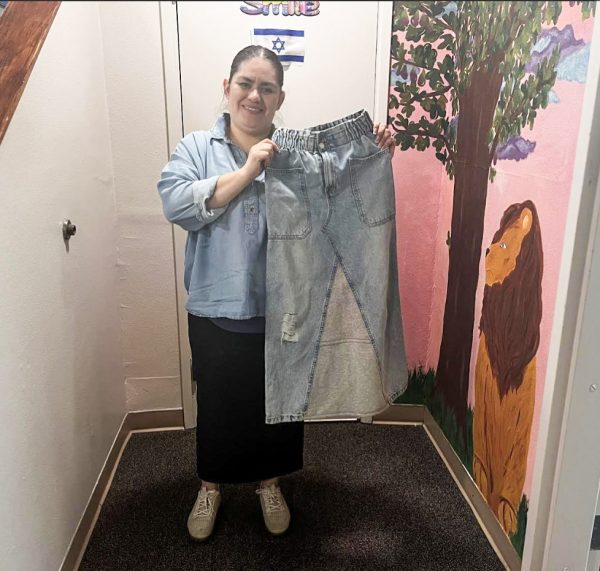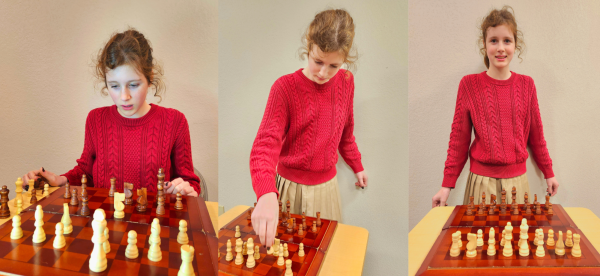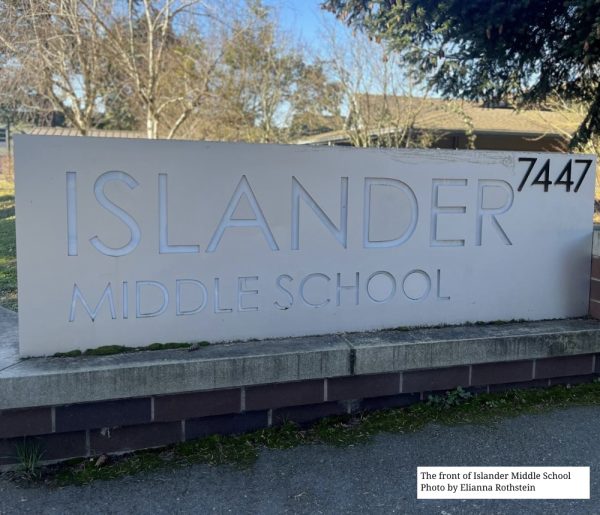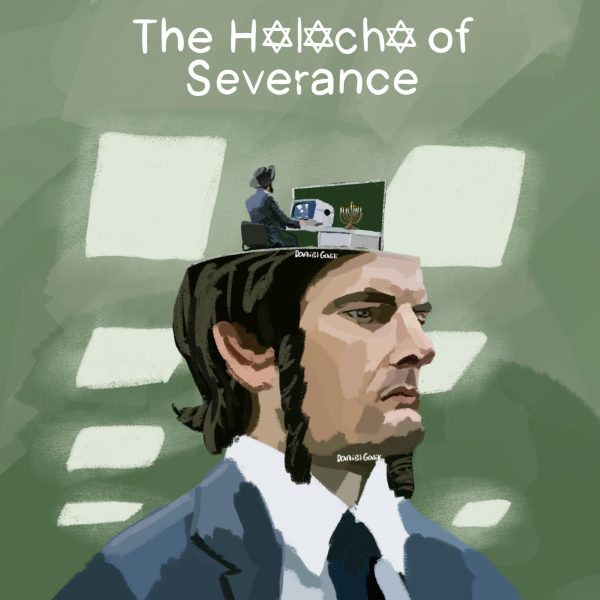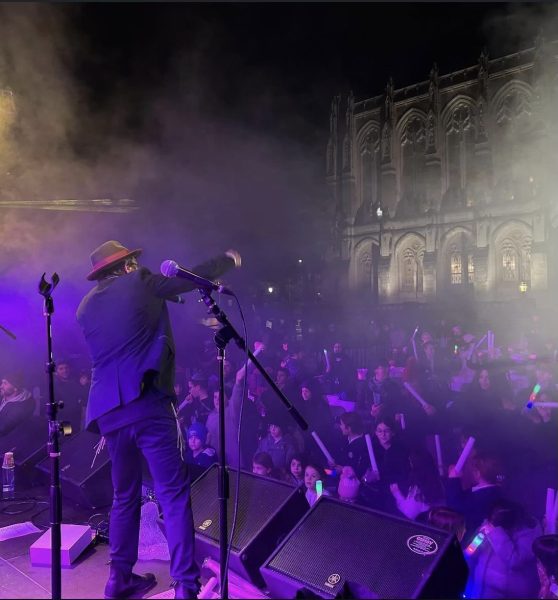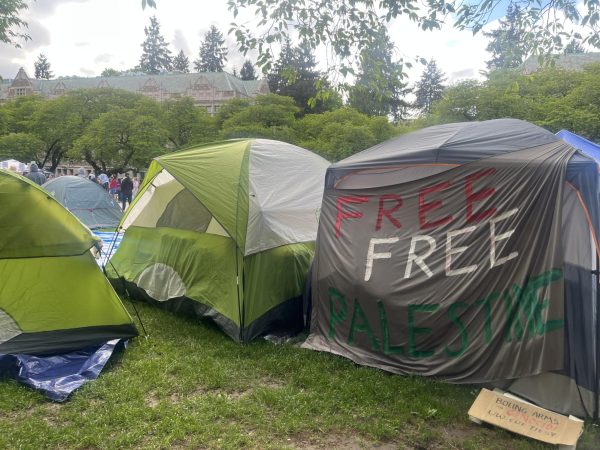What will the future hold for Women’s Megillah?
When an NYHS mom noticed how low the girls had to bend over a table to read the Megillah, an idea came to her: what if they switched rooms with the boys’ Megillah reading every other year? The girls read Megillah in one of the larger classrooms, full of students, family and friends, while the boys sit in the Beit Midrash and listen to Rabbi Kornfeld read at a lectern. Despite being held in the school’s second largest classroom, the women’s Megillah reading was cramped and wasn’t decorated for the event; the only sign regarding Purim was the TV screen that displayed the words “women’s Megillah reading.”
“It didn’t annoy me, but I just feel like if you want to really be a beacon of equality, then there’s no reason the girls can’t be in the Beit Midrash,” said Bryna Runeman. “By letting the girls switch off each year, it shows the girls that they are also important.”
The NYHS women’s Megillah reading this year was only the second women’s Megillah reading at NYHS, with five student readers, along with Judaics teacher Mrs. Hason, operations manager Ms. Rosenberg and NYHS parent Mrs. Rothstein.
However, the entire future of the women’s Megillah readings is in question. For one, many NYHS girls don’t feel comfortable reading Megillah. No freshmen read at all. “I was nervous about how I would read since I am not very fluent in Hebrew,” said freshman Avital Aronov.
Additionally, some girls said they don’t want to read because they do not want to go to school on Purim.
The other issue is that NYHS is getting a new head of school next year. Rabbi Yehuda Gabay said he will support the women’s Megillah reading as long as the experience is intentional. “If women are feeling that they are more connected to Hashem with this megillah reading, then it’s fine,” said Gabay. “If that’s not the case, then we’re missing the whole point.” In his opinion, Megillah reading is all about connecting with God and bringing Hashem into our lives.
It isn’t common for women to read Megillah, especially at school, so it’s a foreign concept to many at NYHS. “I grew up where reading Megillah was a guys thing, something my grandfather and brother do,” said freshman Keira Birk. In most Orthodox communities, women don’t read Megillah, but they are obligated to hear it, just like the men. Some Orthodox rabbis say that women should hear the scroll chanted but should not chant it themselves. Many women enjoy reading Megillah because Purim is a female-led holiday, and it’s a way to connect to Judaism because Orthodox women traditionally don’t read from the Torah.
However, the NYHS boys don’t read Megillah either. “I’d actually like the boys to start reading again,” said English teacher Andy Kaplan, referring to back in 2019 when the NYHS boys read Megillah themselves. But this ended after the seniors who were interested in reading graduated and others lost interest due to the fact that they already get to read Torah.
Teachers do not necessarily have any problems with the girls reading in the Beit Midrash. “It’s not an issue of who deserves to be in space,” said Mrs. Hasson, noting that her main concern was how long it would take the boys to leave the Beit Midrash after davening.
Rabbi Rothstein explained that Megillah is read after the Torah service. Since the school follows the Sephardic tradition of returning the Torah to the Aron Kodesh only after reading the Megillah, unlike Ashkenazim, the minyan must continue in the same room from start to finish, particularly if the Torah is still out.
Some NYHS boys don’t have a problem with it, either.“I have nothing against it, Megillah reading can be done anywhere, not just in the Beit Midrash,” said senior Max Kutapov. “It’s not just for the boys to have.”. Isaac Almo, a sophomore, agreed. “I strongly believe that it is fair to allow both boys and girls an opportunity to read Megillah in our Bet Midrash.”
Rabbi Gabay confirmed that he will support the women’s Megillah reading in any way he can to ensure the comfortability of both the readers and listeners, and he’s open to finding solutions to fix any problems. Additionally, Mrs. Hason, who was in charge of the women’s Megillah reading, is considering ways to extend the activity to students and further its improvement. The return of Mrs. Rothstein to NYHS next year may boost the prospects of more girls reading. Mrs. Rothstein, who changed jobs last year but is coming back to NYHS this fall, is known to be a key player in the girls’ Jewish studies. Mrs. Rothstein played an active role in both women’s Megillah readings.
All the girls interviewed agreed that they support their female peers reading Megillah. “I am all in for it,” said sophomore Ariana Balkany. “I think it’s really empowering for us women and it gives us an opportunity to do more and test our limits.”
“I had a great experience with the women’s Megillah reading, and I am very grateful for the opportunity I was given by NYHS to do this,” added senior Merav Frank. “I think it’s a very special experience that I grew a lot from and had a lot of fun preparing for.”




